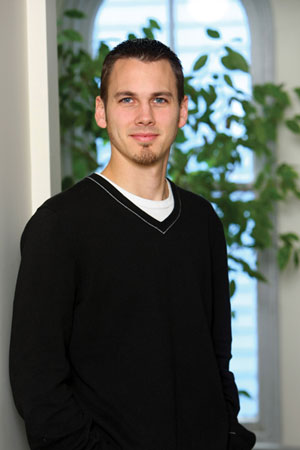 |
| Rev. Brad Close is a chaplain at the Multifaith Centre. (Nick Pearce Photo) |
‚ÄúThere‚Äôs a bit of a stigma, a force field around the Multifaith Centre,‚ÄĚ begins Brad Close.
Over the past four years in which he‚Äôs served as the Christian Reformed chaplain there, he‚Äôs heard different reasons for this. ‚ÄúSome people have the idea that there are a bunch of religious quacks in there or that the chaplains are out to convert people. (But) I‚Äôm here to encourage people to have a holistic understanding of their humanity and their experience of the world.‚ÄĚ
There can be a tendency to compartmentalize spirituality as something outside of the everyday course of life, speculates Rev. Close. He suggests a chaplaincy service on campus can present an alternative to such compartmentalization.
‚ÄúWe understand that there is more to the person than the mind. Spirituality, physicality, the intellectual self... communal existence and emotional wellbeing are all important parts‚ÄĚ of an individual, he says. ‚ÄúWe all struggle. We all have a yearning in our hearts. We can help articulate that. We want people to know they have a safe place here‚ÄĒthat you don‚Äôt have to conceal bits and pieces of your identity.‚Ä̬†¬†¬†
Many faith practices are represented at the Multifaith Centre, including a range of Christian denominations, as well as Buddhist, Jewish, Islamic and Hindu traditions. Visitors can meet with on-duty chaplains or be referred to other chaplains or services depending on the individual’s needs and faith tradition. Rev. Close says people come by to talk, sometimes seeking community, connectedness and friendship. Others come to pray, either in community or privately with a chaplain. Christian and Muslim prayer as well as Zen meditation groups are held at the centre.
Rev. Close sees prayer and community as primary to a spiritual life. ‚ÄúI see community as broadly as you can imagine‚ÄĒblood relations, the church family, people I know on campus and the broader community, the marginalized.¬† I want to live in communion with them.‚Ä̬†
The centre faces some challenges, particularly being situated in an academic setting.¬† ‚ÄúIn our culture, there is an anti-religious sentiment. There are some professors on campus who give religion a hard time in class. But there are also professors on campus who are not antagonistic to faith‚ÄĒChristian, Jewish, Muslim faculty‚ÄĒthey‚Äôre making room, they‚Äôre not preaching.‚Ä̬†
The centre‚Äôs website includes cautionary information about what it describes as ‚Äúaggressive religious groups on campus,‚ÄĚ red-flagging as pressure groups those claiming to have all the answers. Of fundamental importance, the centre asserts, is informed and free choice in following a faith path and a respect for ‚Äúlearning and truth in a free and open environment.‚ÄĚ
Rev. Close doesn‚Äôt see an individual‚Äôs spirituality as something separate or removed from the everyday aspects of living, but rather as part of an integrated whole. ‚ÄúThere‚Äôs the simple notion that people come here to study, but there‚Äôs also a perception that there may be another set of questions‚ÄĒquestions about meaning, morality, destiny, the bigger stuff.
‚ÄúThe academic enterprise only goes so far,‚ÄĚ he says, in addressing those questions.¬†
